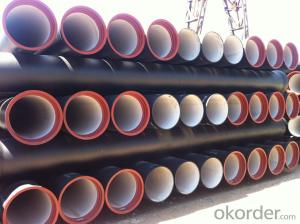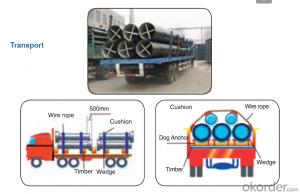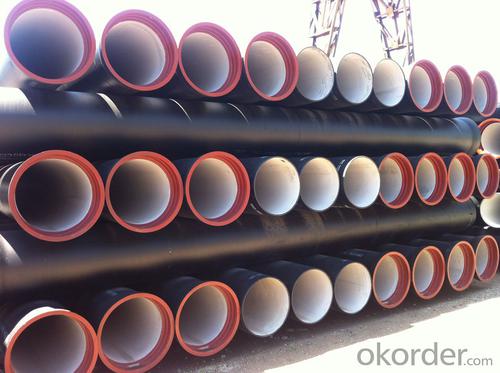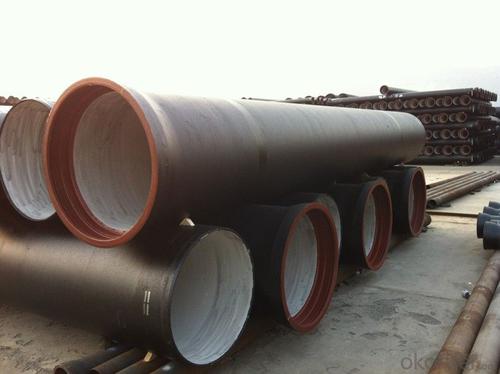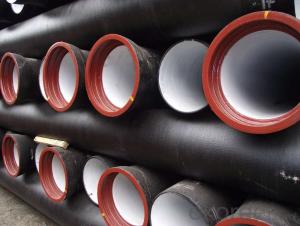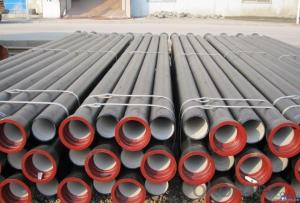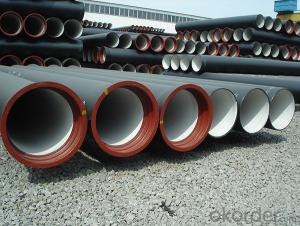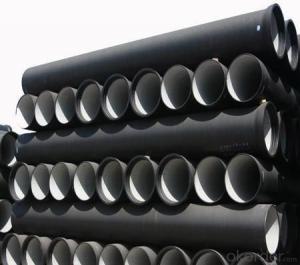Duct Iron Pipe DI Pipe ISO 2531 DN 80-2000mm K9
- Loading Port:
- Tianjin
- Payment Terms:
- TT OR LC
- Min Order Qty:
- 100 m
- Supply Capability:
- 100000 m/month
OKorder Service Pledge
OKorder Financial Service
You Might Also Like
Specification:
1. size : DN80-DN2000 available with PN16 or PN10 or PN25 flanges
2.Standard : ISO2531/EN545/EN598/AWWA standard
3. WRAS Potable Water FBE Internal Lining
4.Material : Ductile iron
5.Technical: Casting
6. Type: Socket / flange PN10 / PN16 / PN25
7. Length=6m, 5.8m
8. Coating: Fusion bonded epoxy to 300 microns Dry Film Thickness
Portland cement lining internally and zinc-rich paint with not less than 70 microns bitumen externally
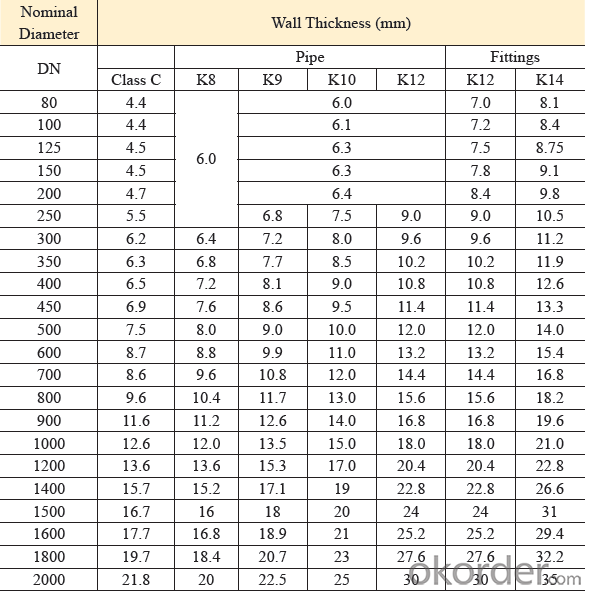
Quality:
ISO 2531 or EN 545 Standard K9 Class, K12 Class
1. ISO 9001 Certificate
2. ISO 2531 & EN 545 Certificate
3. WRAS Potable Water Certificate for FBE Internal Lining
4. WRAS EPDM Rubber Gasket or NBR Rubber Gasket
5. DN80mm - DN2000mm
6. Black Bitumen or Blue FBE / Epoxy Coating
7. Lengh = 6m or cut into 5.6m, 5.7m, 5.8m
8. Client's Brand Customization Allowable
9. Container or Bulk Loading / Shipping
10.Delivery within one Month or According to Client's Order Quantity
11. Support Client or The Third Party Inspection before Shipment
Standard Lining and Coating:
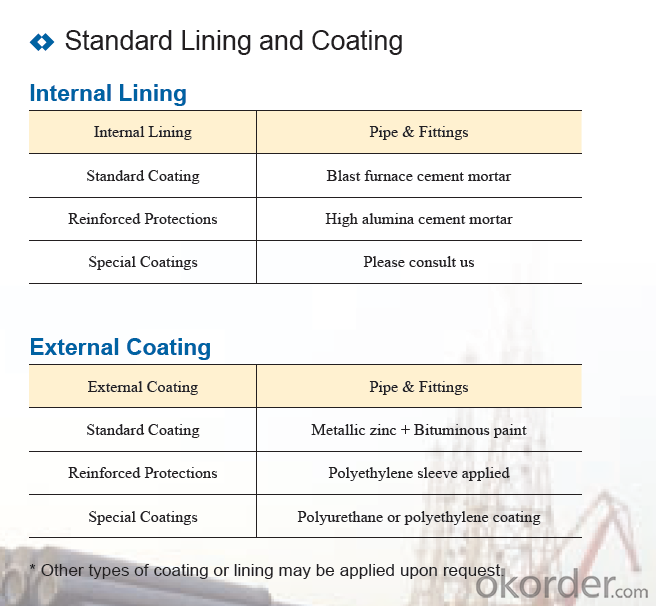
Transport:
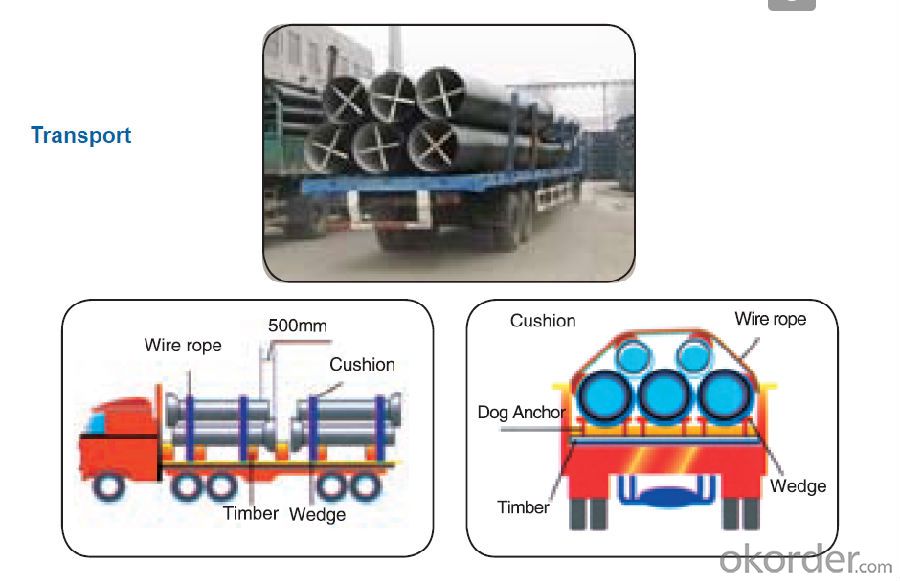
- Q: Can ductile iron pipe be used for water supply to remote areas?
- Yes, ductile iron pipe can be used for water supply to remote areas. Ductile iron pipe is known for its durability, strength, and corrosion resistance, making it suitable for long-distance water supply systems. It can withstand challenging terrains and harsh weather conditions, ensuring reliable water supply to remote areas.
- Q: What is the maximum allowable joint deflection for ductile iron pipes?
- Industry standards and guidelines typically specify the maximum allowable joint deflection for ductile iron pipes. These standards can vary depending on the specific application and local regulations. Typically, the maximum allowable joint deflection for ductile iron pipes is limited to a range of 1% to 5% of the pipe diameter. This means that the pipe can tolerate a deflection of up to 1% to 5% of its diameter without causing significant damage or compromising its structural integrity. However, it is important to consider factors such as pipe size, wall thickness, and operating conditions as these can affect the exact maximum allowable joint deflection. For specific guidelines on the maximum allowable joint deflection for ductile iron pipes in a given application, it is recommended to consult relevant industry standards like those published by the American Water Works Association (AWWA) or the International Organization for Standardization (ISO).
- Q: What are the different methods for anchoring ductile iron pipe?
- Depending on the specific application and requirements, there are various methods available for anchoring ductile iron pipe. One method involves the construction of concrete thrust blocks around the pipe at points where there are changes in direction or diameter. These blocks resist the thrust forces from the flowing water and prevent pipe movement. Another option is to install concrete collars or rings at regular intervals along the pipe. These collars provide additional support and prevent lateral movement. They are created by pouring concrete into a pre-made mold surrounding the pipe. Pipe clamps are metal brackets that can be attached to the pipe and anchored to a structure or support system. They come in different sizes and designs, allowing for flexible installation and adjustment as needed. Pipe restraints are specifically designed devices to restrict the movement of ductile iron pipe. Typically, they consist of a metal band or collar tightened around the pipe and attached to a concrete structure or anchoring system. The bell and spigot joint itself can serve as a means of anchoring the pipe. The bell end of one pipe fits over the spigot end of another, creating a tight connection that resists movement. Properly compacted soil surrounding the pipe can also provide some level of anchoring. The soil should be compacted in layers around the pipe to ensure stability and prevent movement. It is important to consider factors such as soil conditions, pipe diameter, operating pressure, and location when selecting the appropriate anchoring method. Consulting industry standards, guidelines, and a qualified engineer is crucial in determining the best anchoring method for a specific ductile iron pipe installation.
- Q: Can ductile iron pipes be used in acidic environments?
- Ductile iron pipes are capable of being utilized in acidic environments. These pipes possess a strong resistance to corrosion, rendering them suitable for a wide range of applications, including those involving acidic conditions. The heightened carbon content found in ductile iron pipes generates a shielding layer on the pipe's surface, effectively thwarting direct attacks from acid on the iron. Furthermore, the interior lining of the pipe can be coated with epoxy or other protective substances to bolster its resistance to corrosion in acidic settings. Nevertheless, it is crucial to take into account the precise concentration and type of acid present within the environment, as certain acids may still induce corrosion over time. It is highly recommended to seek counsel from professionals or manufacturers to ensure the appropriate selection of materials for specific acidic conditions.
- Q: Are ductile iron pipes suitable for airport runway drainage?
- Yes, ductile iron pipes are suitable for airport runway drainage. Ductile iron pipes have excellent strength and durability, making them capable of withstanding heavy loads and extreme conditions, which are often encountered in airport operations. They are resistant to corrosion, which is crucial in a drainage system that may be exposed to various chemicals and environmental factors. Ductile iron pipes also have smooth inner surfaces, allowing for efficient flow of water and preventing blockages that could disrupt the drainage system. Additionally, they are easy to install and maintain, making them a reliable choice for airport runway drainage systems.
- Q: What is the expected abrasion resistance of ductile iron pipes?
- The expected abrasion resistance of ductile iron pipes is generally high, as they are known for their durability and ability to withstand wear and tear caused by abrasion over an extended period of time.
- Q: How do we handle the leaking of the ductile iron pipe?
- In order to repair the defects of castings, the same or similar materials are usually adopted, and the materials with better performance or special requirements are used under special circumstances. Before welding, it is necessary to check the defects, determine the location, size and nature of the defects, and dig them out in accordance with the relevant measures, and then weld them again. Therefore, the preparation before welding must be in place.
- Q: Are ductile iron pipes suitable for wastewater pumping stations?
- Yes, ductile iron pipes are suitable for wastewater pumping stations. Ductile iron is a strong and durable material that can withstand the harsh and corrosive nature of wastewater. It has excellent resistance to abrasion, corrosion, and impact, making it a reliable choice for wastewater applications. Additionally, ductile iron pipes have a high tensile strength and can handle high-pressure situations, making them suitable for pumping stations where wastewater needs to be transported over long distances or through elevated areas. The smooth interior surface of ductile iron pipes also helps to minimize friction and enhance the flow of wastewater, reducing the risk of clogging or blockages. Overall, ductile iron pipes provide a cost-effective and long-lasting solution for wastewater pumping stations.
- Q: Can ductile iron pipe be used for water well applications?
- Indeed, water well applications can utilize ductile iron pipe. Renowned for its robustness and durability, ductile iron pipe proves appropriate for a multitude of uses, notably water well systems. Its remarkable resistance to corrosion is paramount in water well applications, as it endures constant exposure to water and potential impurities. Moreover, ductile iron pipe exhibits the capacity to withstand substantial pressure and external loads, rendering it a dependable selection for water well systems necessitating a sturdy and enduring piping material.
- Q: Can ductile iron pipes be used for underground cooling water systems?
- Yes, ductile iron pipes can be used for underground cooling water systems. Ductile iron is known for its strength, durability, and corrosion resistance, making it suitable for various applications, including underground installations. It can withstand the pressure and temperature requirements of cooling water systems, providing a reliable and long-lasting solution.
Send your message to us
Duct Iron Pipe DI Pipe ISO 2531 DN 80-2000mm K9
- Loading Port:
- Tianjin
- Payment Terms:
- TT OR LC
- Min Order Qty:
- 100 m
- Supply Capability:
- 100000 m/month
OKorder Service Pledge
OKorder Financial Service
Similar products
Hot products
Hot Searches
Related keywords
